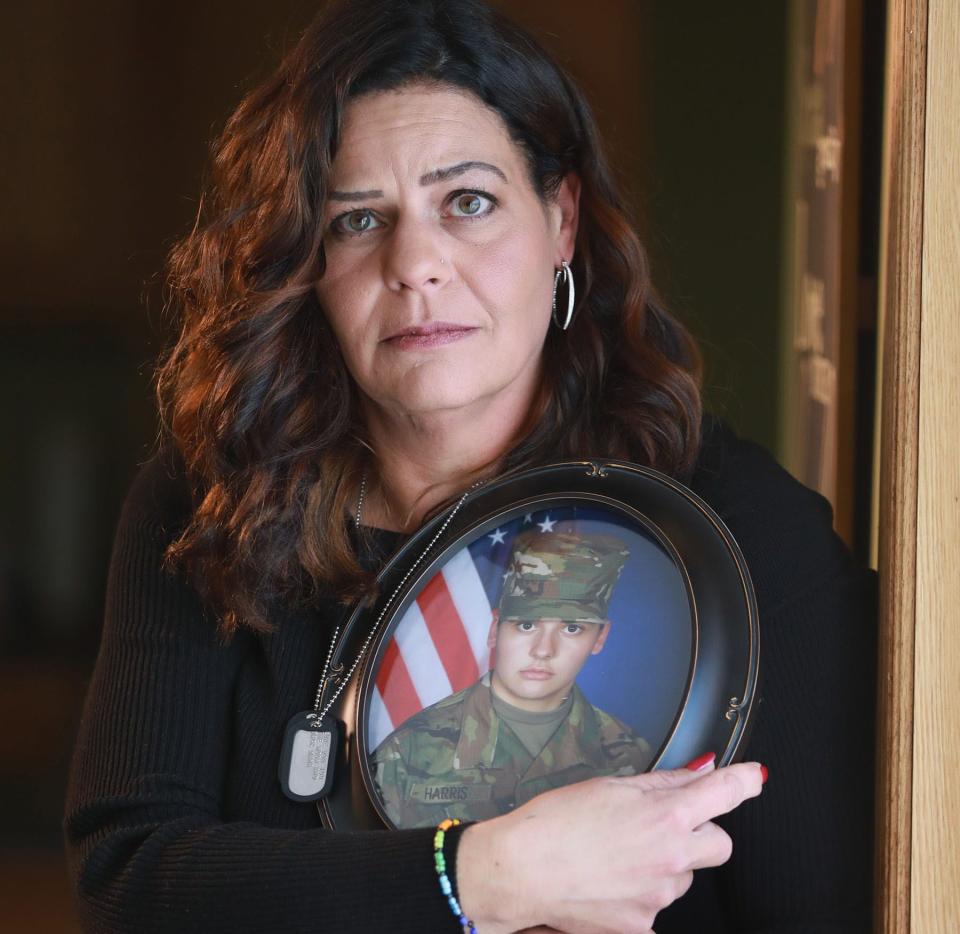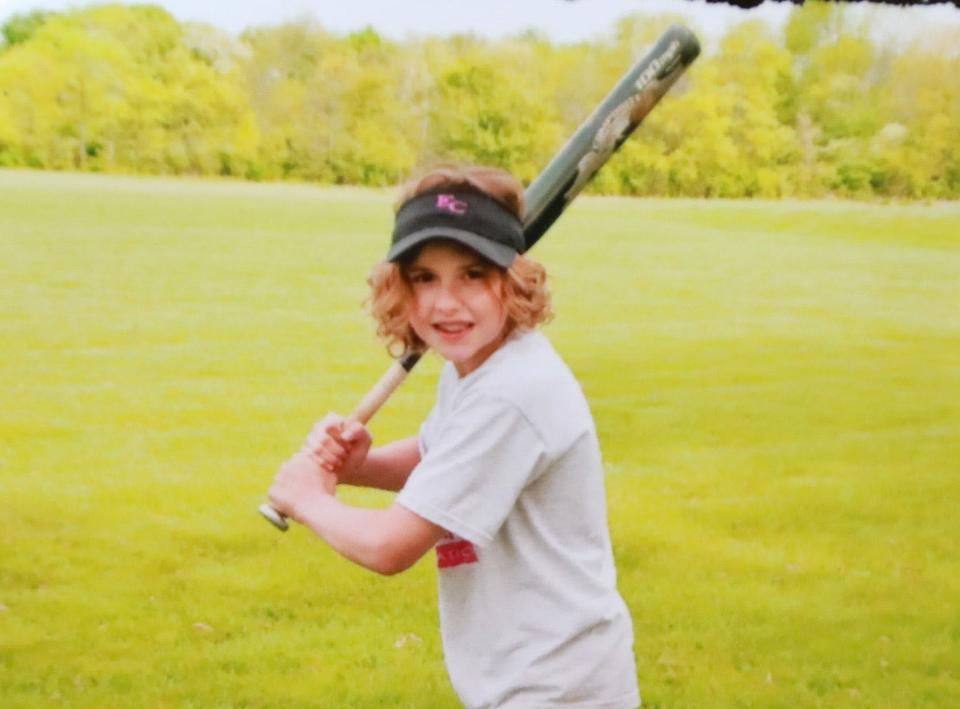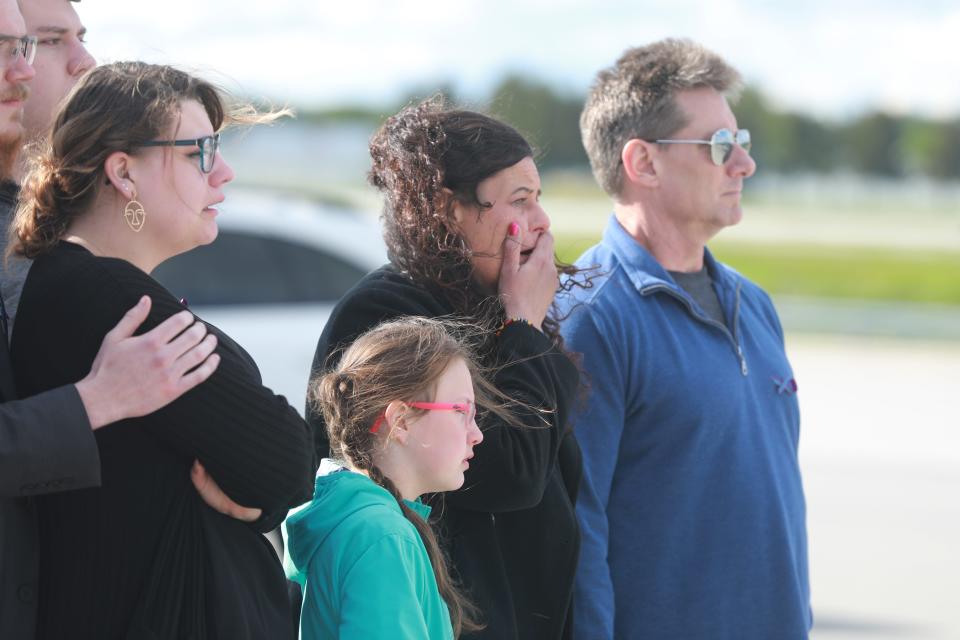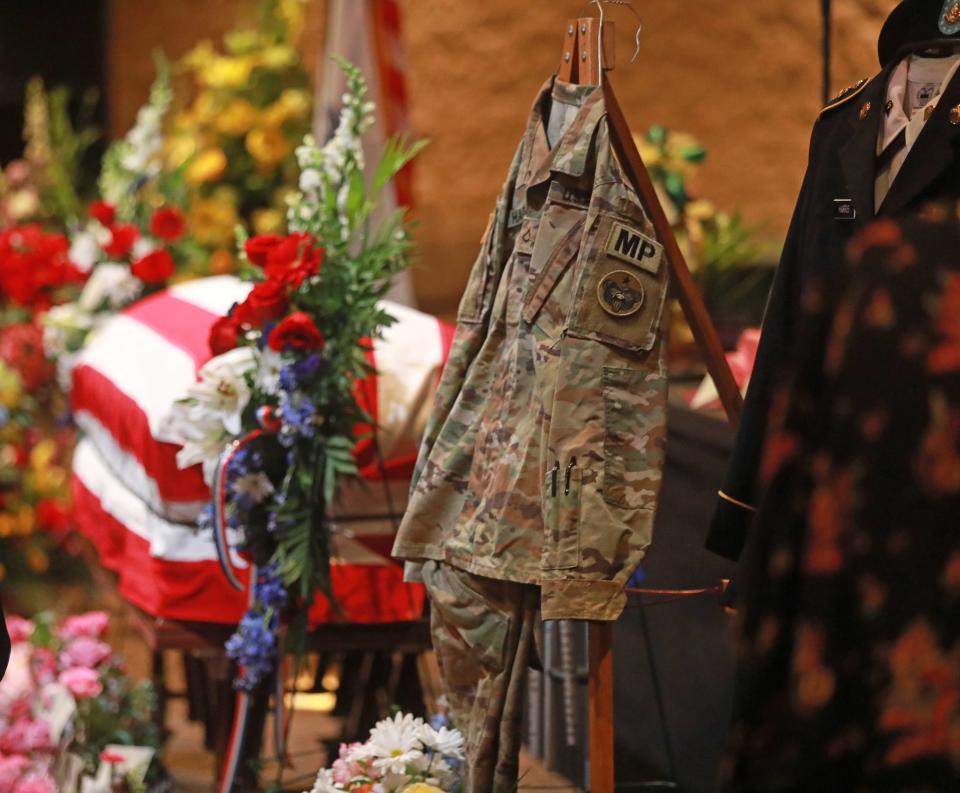After coming out, a soldier was allegedly raped by another military member and died by suicide. Her family says it's a hate crime
At 6:40 a.m. May 3, a pair of military chaplains arrived at Carey Harris' home.
“I opened the door, and I looked right at those two chaplains and I said, ‘My daughter committed suicide,’” Harris said. “She's dead.”
The chaplains confirmed what she'd dreaded. Her daughter had become withdrawn. Over a few short months, their close relationship had turned distant. Harris knew something was wrong, but she didn't know what.
She learned in a blur of briefings that her daughter had filed a sexual assault complaint alleging that a fellow service member attacked her 10 days after she had disclosed her sexual orientation on Facebook; that she'd expressed thoughts of suicide and been under counseling and a do-not-arm order; and that a misstep by the military led to her daughter coming into contact with her alleged assailant, despite a protective order designed to keep them apart.

Days after that contact, after her do-not-arm order lapsed, she bought a handgun at Joint Base Elmendorf-Richardson in Alaska and took her own life.
Pvt. 1st Class Kaylie Harris was 21.
Harris' death represents a confluence of currents that have ripped the military for decades: sexual assault, suicide and integrating LGBTQ troops. Her family said she would have survived if the military had taken her report of sexual assault more seriously and heeded red flags that signaled her deepening mental health crisis. They view the alleged assault that upended her life as a hate crime and want military law changed to protect LGBTQ troops.
"The military talks a lot about suicide prevention and supporting survivors and LGBT troops, but their action rarely equals the words they use," said Don Christensen, president of Protect Our Defenders, an advocacy group for victims of sexual assault in the military. "There still is a culture of disbelief when survivors come forward and an attitude that even if the survivor's allegation is true, 'they should just walk it off.' Too many of these cases end in tragedy like this one, in part because of the military's failure to keep offenders away from their victims."
Ann Stefanek, an Air Force spokeswoman, said the alleged assault is under investigation by the service's Office of Special Investigations.
Stefanek noted that commanders immediately placed the man accused of assaulting Harris in another duty location, pending completion of the investigation, and issued a military protective order to ensure "there was no contact between PFC Harris and the Airman," though both remained on the base near downtown Anchorage. The airman declined to comment, Stefanek said, and decisions remain pending regarding any possible charge.
"Sexual assault and harassment of any kind are inconsistent with the Department of the Air Force’s core values," Stefanek said in a statement.
An Army statement said Harris' death shows the need to prevent and respond to sexual assault.
“No member of the Army team should be subjected to sexual harassment, sexual assault, or associated retaliation," the statement said.
The investigation of the rape and Harris' death is based on interviews with Harris' family, a note from Kaylie Harris, statements from military authorities and recordings of briefings given to the family by military officials.
'My daughter was going to be a soldier'
Kaylie Harris grew up in Springfield, Ohio, a city of about 60,000 people near Columbus and Dayton. She was part of a large, blended family that included three siblings and five step-siblings.
During her senior year in high school, Kaylie Harris came out as a lesbian, said Carey Harris, 44. The decision to come out was hard for Kaylie, her mother said, but she eventually became "loud and proud" about her orientation.

Kaylie expressed interest in joining the Army but worried that her sexuality would be an impediment to acceptance, Carey Harris said. Before the repeal of the "don't ask, don't tell" policy in 2011, LGBTQ troops had to conceal their orientation or face discharge.
Kaylie discussed those concerns, as well as concerns about sexual assault, with her recruiter, according to her mother.
There was reason to worry: the military's most recent comprehensive survey of sexual crimes in the ranks showed a 38% increase in assaults from 2016 to 2018.
Military academies: COVID-19 delays sexual assault follow-up
She was assured that gay and lesbian troops no longer faced discrimination and that the Army's Sexual Assault/Harassment Response and Prevention program aimed to protect women.
"My daughter was going to be a soldier," Carey Harris said. "That was her thing."
Serving in the military tracked with Kaylie's goals, said her sister, Lillian Harris, 20.
"She just always liked the idea of the best way she could help people. She's always wanted to be a police officer," Lillian said.
Kaylie trained at Fort Leonard Wood, Missouri, and arrived in Alaska for her first duty assignment. Her specialty, 35B: a military police officer. She looked forward to a career in law enforcement.

Life in the Army seemed to suit Kaylie, said her stepsister, Valerie Matson, 32, who served on active duty in the Air Force as a master sergeant. She found a sense of belonging in the military community, a feeling the sisters shared, Matson said.
"Kaylie enjoyed the military," Matson said. "She was doing well, she was happy. She looked good, healthy. She had a glow to her."
Carey Harris visited her daughter last fall and all seemed well. Kaylie had adapted.
She told her mother that Alaska was her "paradise."
But it didn't last.
A tragic timeline
On Jan. 21, Kaylie Harris posted on Facebook about her sexual orientation.
"How did no one figure out I was gay!? I'm looking at my childhood pictures and I scream baby gay. How guys?!" She posted with laughing emojis.
Her cover photo featured a group of troops posing with their COVID-19 masks on. She belonged to the 673rd Security Forces Squadron, made up of about 30 Army and 420 Air Force personnel.
The night of Jan. 30 into the morning of Jan. 31, Kaylie was allegedly attacked by an Air Force airman she had considered a friend, according to a timeline provided by the family's lawyer Ben Beliles. They had been assigned to the same unit charged with base security.
Several days later, she reported the alleged assault, and an investigation began. A no-contact order was put in place to keep the man away from her, but he was not held in confinement while awaiting potential charges.
Their usual three or four FaceTime calls per week between mother and daughter ended in February. Her sister didn't hear much from her, either. "We shared a room growing up, we were always with each other side-by-side for everything," Lillian said. Calls were short, and Kaylie sometimes "snapped," her mother recalled.
Getting into arguments, lacking trust or not feeling as close with family and friends is common after sexual assault, according to RAINN (the Rape, Abuse and Incest National Network).
Kaylie continued to avoid her mother's calls in March and by the last week of the month had expressed thoughts about suicide to others. The Army ordered her not to possess a weapon, according to a recording of the briefing investigators gave Carey Harris after her daughter's death. Stefanek confirmed that investigators determined that Kaylie made statements concerning self-harm at the end of March. Commanders were made aware of those statements and immediately limited her duty and linked her with mental health services.
Carey Harris said she called a suicide hotline twice on her daughter's behalf.

"They talked to me, they're really good," Carey said. "But they never followed up with me."
At the end of April, events leading up to Kaylie's death piled up rapidly. On April 22, Kaylie Harris returned to duty, the order preventing her from carrying a weapon lifted. The decision was made after close consultation between Harris, her mental health services provider and her commanders, Stefanek said. It was Harris' wish to return to duty.
She was scheduled for training to prepare for resuming patrol duties. Her alleged attacker was in the same building for training despite the protective order. They encountered each other, and the meeting left Kaylie reeling, according to her mother.
The circumstances of Kaylie Harris' meeting her alleged attacker are under investigation, according to Stefanek, the Air Force spokeswoman.
On May 2, she went to the base exchange with another service member and bought a handgun. Her companion reminded her that the weapon had to be registered immediately. Harris offered assurances that she would do so but instead went home with it, saying she wanted to take a nap first.
She typed a suicide note.
She named her alleged attacker, saying he "showed me how dark people are, how people could hurt others for pleasure." She absolved her military leaders and doctor and praised some of her fellow troops. She wrote of despair she couldn't bear and concluded: "My deepest apologies, Kaylie M Harris."
She'd been a soldier for less than a year.
Preventing suicide
Suicide among troops, though comparable in rate to the general population, has proved to be a long-term problem for the Pentagon with no sign of improvement. In 2019, the most recent year for which full data is available, 498 troops died by suicide. A Pentagon report noted that rate among active-duty troops in 2019 was comparable to 2017 "but not going in the right direction."
Survivor: Suicide never entered chief warrant officer's mind. Then 9/11 happened
Harris' suicide appears to have been preventable, said Jennifer Dane, executive director of the Modern Military Association, an advocacy group for LGBTQ troops and veterans. She noted that Harris' superiors had multiple chances to intervene and her purchase of the weapon she used to take her life could have been prevented.
Reach out: Do you know of wrongdoing in the military? E-mail military@usatoday.com to share your story.
"There are so many points of failure," said Dane, an Air Force veteran. "This is another example of leadership failure. It's awful."
The link between sexual assault and increased risk of suicide has been documented for decades. In 2020, an analysis of multiple studies reflecting more than 88,000 participants found nearly 30% of sexual assault victims had suicidal thoughts, according to the journal Psychological Trauma.
Carey Harris met her daughter's flag-draped casket at home in Ohio, a military honor guard on hand to transfer the body to a hearse.

"She took an oath to die for our country," Harris said. "Not to be taken out by a fellow soldier."
No such thing as hate crime in the military
Beliles, the family's lawyer and a former military prosecutor, said Kaylie's family wants answers about why she was returned to duty, allowed to carry a weapon and buy another given her mental health issues. Another concern: why Kaylie and her accused attacker were assigned to train in the same building, resulting in their encounter days before her death.
"We want to get to the bottom of how the military allowed that to happen," Beliles said.
Beliles said Harris' family wants military law changed to include hate crimes to protect LGBTQ troops.
“I asked them, ‘Did this man know that she was a lesbian?’ and they said, ‘Oh, absolutely ... everybody knew,’” Carey Harris said.
Sexual assault can be "used as a weapon against people who identify as LGBTQ," according to the National Sexual Violence Resource Center, motivated by bias to punish or "fix" their orientation.
The Air Force and Army will explore any motivations for the alleged assault, Stefanek said, and investigators will remain engaged with the family.
The FBI defines a hate crime as a “criminal offense against a person or property motivated in whole or in part by an offender’s bias against a race, religion, disability, sexual orientation, ethnicity, gender, or gender identity,” and roughly 1 in 5 hate crimes are motivated by anti-LGBTQ bias.
Approximately 1 in 8 lesbian women (13%), nearly half of bisexual women (46%) and 1 in 6 heterosexual women (17%) have been raped, according to Centers for Disease Control and Prevention data from 2010. In 2019, research published in the Journal of Interpersonal Violence found that 63% of bisexual, 49% of lesbian and 35% of heterosexual women reported experiencing rape and that sexual orientation played a role in sexual victimization risk, independent of other measured sociodemographic indicators, such as race, education or income.
LGBTQ: High rates of sexual victimization met with less support
No specific section of the Uniform Code of Military Justice refers to hate crimes, and it's difficult to know how prevalent attacks on LGBTQ troops are because the Pentagon doesn't track them, Dane said.
Obtaining a conviction in the case would be difficult, said Eugene Fidell, an expert on military law and professor at New York University Law School. Kaylie probably would have been the main witness.
Punishments in military law are severe enough for sexual assault that Congress seems unlikely to intervene, and adding a provision for hate crimes probably requires more than a single example, Fidell said.
"You [the military] opened it up for the gay and transgender population to come in, but you don't have a way to protect them," Carey Harris said. "That's not right."
Resources
Service members and veterans who are in crisis or having thoughts of suicide and those who know a service member or veteran in crisis can call the Military Crisis Line/Veterans Crisis Line for confidential support 24 hours a day, seven days a week, 365 days a year. Call 1-800-273-8255 and Press 1 or text 838255 or chat online at VeteransCrisisLine.net/Chat.
If you are a survivor of sexual assault, you can call the National Sexual Assault Hotline at 800-656-HOPE (4673) or visit hotline.rainn.org/online and receive confidential support.
The Trevor Project helps LGBTQ+ people struggling with thoughts of suicide at 866-488-7386 or text 678-678.
The LGBT National Help Center National Hotline can be reached at 1-888-843-4564.
Credits:
Photos and video by Doral Chenoweth, The Columbus Dispatch, USA TODAY Network.
Graphic by Jim Sergent, USA TODAY.
This article originally appeared on USA TODAY: Military suicide: Family says daughter's sexual assault was hate crime

